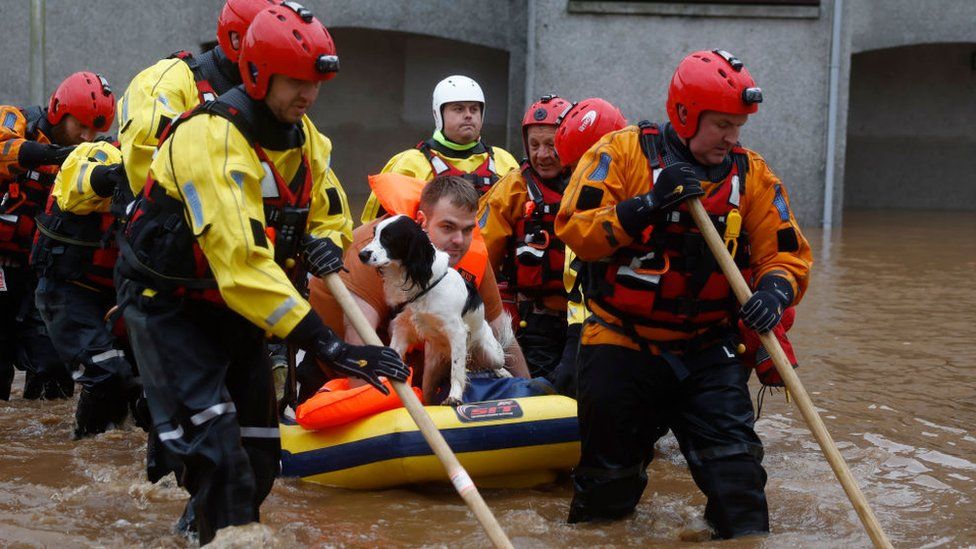
Rescue teams helped people leave their flooded homes in Brechin in Scotland on Friday
The second red “danger to life” weather alert in a week is due to take effect in Scotland, with torrential rain and high winds forecast across the UK.
Forecasters say another 70-100mm (4ins) of rain could fall on Saturday in parts of Angus and Aberdeenshire already hit by severe flooding.
Three people have died since Thursday, when Storm Babet first took hold.
People across the country remain in temporary accommodation after being flooded out.
The rare red weather warning runs from midnight, throughout the whole of Saturday.
Amber warnings for rain are in place for Saturday across the Highlands, north east and central parts of Scotland, as well as the north of England, East and West Midlands and parts of Yorkshire.
Yellow warnings for rain and wind cover much of Scotland, England and Wales.
Storm Babet: The story so far
A bridge in Glen Clova, Angus, is swept away after Storm Babet brought intense rainfall.
- Three people have died including a man in his 60s who was caught in fast-flowing flood water in the town of Cleobury Mortimer in Shropshire on Friday
- A 56-year-old man died after his van hit a tree near Forfar, and a 67-year-old woman was killed after being swept into the Water of Lee
- Dozens of people have taken shelter in emergency accommodation – many in Angus and Aberdeenshire as well as 50 in the rural village of Debenham, Suffolk
- In Scotland, roads and bridges collapsed and dozens of households had to be rescued in Angus, where flood defences had been overwhelmed in the early hours – river levels rose 4.4m (14ft) higher than normal and continued to increase through Friday
- Across England, there were more than 280 flood warnings and 240 alerts on Friday evening
- Almost 13,000 households were without power late on Friday night – 10,000 across England and 2,800 in Scotland
- Police forces have advised against travel in the red alert area and to avoid it in areas covered by amber warnings
- Earlier on Friday Leeds Bradford Airport shut after a plane skid off the runway in the storm
Watch: Emergency services surround plane at Leeds Bradford Airport after it skidded off the runway
Angus Council – the area hit by the first red alert on Thursday – said it was prepared to call on the military for assistance if the situation in the region worsens significantly.
A 200-year-old bridge on the Rottal Estate in the area was washed away by torrential flood water, while a road connecting Marykirk, Angus, where some houses were evacuated also collapsed.
Police urged people not to travel in the red zone, and said drivers throughout Scotland should show caution.
Assistant Chief Constable Stuart Houston said: “We’re going to see significant amounts of rainfall across all parts of the country.
“I think all drivers should be mindful about making journeys at this time. Plan ahead.”
Searches are continuing for a driver who was reported to be trapped in a vehicle near Marykirk in Aberdeenshire in the early hours of Friday.
Brechin in Angus was one of the worst hit areas as water levels in the River South Esk rose by 4.4m (14ft).
The council had urged people living in about 400 homes in the town and surrounding areas to evacuate their properties, but many stayed put and about 60 households were later rescued.
More than 70 people were being looked after a rest centres in Brechin, Montrose and Forfar on Friday, with locals donating dry clothing, food and toiletries.
After appealing for private landlords and Airbnb owners to provide accommodation, Angus Council said it had been “overwhelmed by the amazing response”.
Image source, West Midlands Fire Service
A woman was rescued in Wombourne, Staffordshire, after her car got stuck in a flooded ford and she was swept downstream
Flooding caused 70-minute delays on the A1 near Grantham, National Highways said, while further south, Suffolk declared a major incident on Friday as Storm Babet caused “major flooding” across the county.
The rural village of Debenham was cut off by flooding, residents said, while tractors were being used to rescue people caught in the flood water.
Around 50 people were sheltering in the local leisure centre there and sleeping on crash matts, staff said.
Shelters in Scotland will continue to operate over the weekend.
What is a red weather warning?
Red is the most severe of the Met Office’s three coloured weather warnings.
It means that dangerous weather is expected and, if you have not already done so, you should take action now to keep yourself and others safe from the impact of the severe weather.
It is very likely that there will be a risk to life, with substantial disruption to travel, energy supplies and possibly widespread damage to property and infrastructure.
You should avoid travelling, where possible, and follow the advice of the emergency services and local authorities.
You can read more about the weather warning system here.
Are you in a region affected by the storm? Share your experiences by emailing haveyoursay@bbc.co.uk.
Please include a contact number if you are willing to speak to a BBC journalist. You can also get in touch in the following ways:







